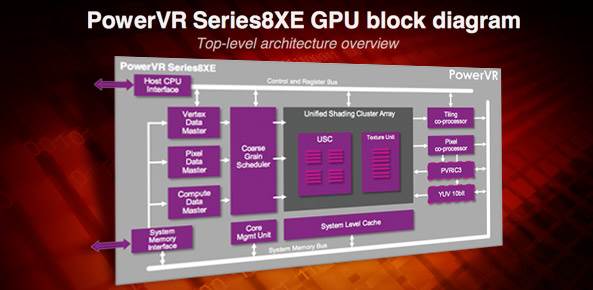Does it strain the imagination to picture a top-flight graphics processing unit (GPU) in an inexpensive phone? U.K.-based Imagination Technologies doesn’t think it should, so it’s working to improve its GPU for lower-cost devices. That should be welcome news for mobile users who have small budgets but want big graphics performance.
The company debuted its PowerVR Series8XE GPU (pictured above) family, intended for the affordable mobile segment, at Mobile World Congress in Barcelona today. Imagination, which designs the graphics chips for the iPhone 6s and HTC One M9 Plus, contends that its latest GPU family will set a new standard for performance, power, and area in cost-sensitive markets.
Fewer Slowdowns
Imagination designs processor cores, but does not manufacture chips. The company’s primary business lines are MIPS microprocessor cores, PowerVR graphics cores, and Ensigma software-defined radios. Imagination’s clients license its core designs, add their own functionality and turn them into chips.
Currently, most entry-level mobile devices are still integrating OpenGL ES 2.0-only GPUs, according to Imagination. The new Series8XE family lets Imagination’s silicon partners and OEMs upgrade the feature sets of mobile chip systems to OpenGL ES 3.2 and Vulkan, the company said.
That makes the mobile devices better able to support the latest applications and advancements in APIs (application program interfaces). The company added that having Vulkan and OpenGL ES 3.2 available to OEMs and developers means they can reuse the software created for mid-range and even high-end parts in entry-level devices.
Vulkan API support helps the new PowerVR Series8XE GPUs by enabling mobile devices to handle graphic-intensive content without any slowdowns. Imagination said that Vulkan also reduces the driver overhead in graphics applications, which can cause slowdowns in a phone’s central processing unit.
Graphics Capabilities
The first two GPUs in the PowerVR Series8XE line will be the PowerVR GE8200 and GE8300, which offer two and four pixels per clock, respectively. The two GPUs are available for licensing in scalable configurations. Imagination said that the GPUs have already been licensed by several customers for mobile/tablets, 4K TVs, OTT (over-the-top) set-top boxes, automotive applications and wearables.
The enhanced Series8XE microarchitecture also helps create GPU configurations that are up to 30 percent to 45 percent smaller than competing products — all while still maintaining the same fill rate, according to Imagination. The new GPUs will also come with optional features including improved textures and lossless image compression technology.
The graphics capabilities of the iPhone 6s and 6s Plus come from Imagination’s PowerVR graphics core, while HTC’s One M9 Plus has a Mediatek MT6795T system that integrates Imagination’s PowerVR G6200 graphics core.
Those phones are among the most expensive made by their respective manufacturers, so Imagination is aiming to tweak the technology in its GPUs to find a place in cheaper phones. Its PowerVR Series 8XE design offers low-cost phone makers faster performance and a more compact design than did chips based on previous designs.
Image Credit: Diagram of PowerVR Series8XE GPU family via Imagination Technologies.







